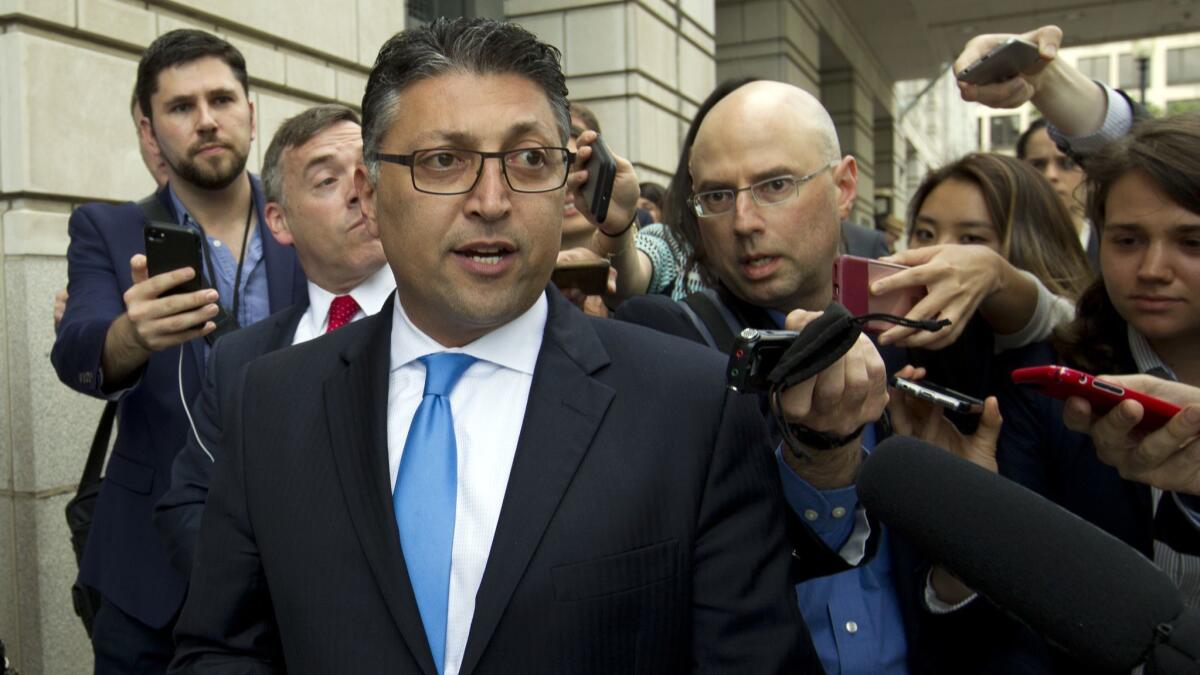Price-fixing prosecutions under Trump are at a historic low for third year

- Share via
Criminal prosecutions for price-fixing under President Trump have remained at historic lows for a third consecutive year, a drop-off in enforcement against big business cartels not seen since the 1970s.
The Department of Justice announced 25 new cases alleging criminal violations of U.S. antitrust laws in fiscal 2019, according to a tally of public filings by the Financial Times.
The figure, an improvement on 2018, meant the Trump administration has brought fewer criminal antitrust prosecutions than any U.S. government for almost half a century.
The persistent slowdown has come despite assurances from Makan Delrahim, chief of the antitrust division since 2017, that he is committed to criminally prosecuting price-fixing and cartels, a realm of competition law that has historically had bipartisan support.
“Criminal enforcement can be resource intensive, but it is one of our most powerful deterrents,” he told the Senate in September, noting that crimes such as price-fixing “reduce faith in the free-market system.”
Criminal fines for antitrust violations have also dropped off dramatically over the last three years. In 2019, the division levied penalties of $300 million, according to the FT’s analysis, an improvement on its previous figures but otherwise the lowest total since 2004.
A Justice Department spokesman declined to comment on the enforcement figures.
“At a time of almost unprecedented corporate consolidation, it’s troubling that the number of antitrust prosecutions pursued by the Justice Department remain at record low levels,” said David Cicilline, the Democratic chair of the House antitrust subcommittee.
Horizon Pharma charges more than $2,000 for a month’s supply of a prescription pain reliever that is the combination of two cheap drugs available separately over the counter.
“Working people should have confidence that the federal government is fighting for them,” he added.
The division’s prosecutions in 2019 included some cases of large-scale price-fixing involving products such as seafood, computer hard disc drives and fuel for military bases in South Korea.
They also included smaller investigations. Six of the cases identified by the FT related to items such as insulated sleeves for beer cans and temporary tattoos.
The decline has accompanied a significant reduction in the number of attorneys and other staff in the units of the antitrust division responsible for criminal enforcement.
As of the end of July, staffing in the five criminal enforcement units had fallen a fifth since Trump took office, with attrition in two Washington-based units more severe, according to figures released in response to a public records request.
The drop was the result of a hiring freeze that was lifted earlier this year, which had resulted in total staff numbers falling to under 600 from more than 700 at the start of the administration. “They’ve been able to hire a little bit but they’re still way below the numbers a few years back,” said one former official.
A Justice Department spokesman said the division had been “in the process of hiring new attorneys since Atty. Gen. [William] Barr removed the hiring freeze.”
“We are pleased that we continue to select from a very strong pool of candidates and have made offers or onboarded over 20 new attorneys across the division,” the spokesman added.
Under the Obama administration, the antitrust division racked up dozens of new cases each year and billions of dollars in fines from investigations into auto parts and financial services.
As those long-running probes have come to a natural end, the latest investigations the division has focused resources on have failed to produce significant new cases to replace them.
At least eight pharmaceutical companies sell a decades-old drug that treats gallstones, but the competition has done little to keep its price down.
After years of looking into alleged price-fixing by generic pharmaceuticals manufacturers, the division has announced only three prosecutions. Two executives admitted price-fixing in 2016 and the third case, this year, was a plea by the company they ran.
The division’s criminal probe into the use of no-poaching agreements has failed to produce a single case, despite Delrahim warning in January 2018 that “in the coming couple of months you will see some announcements.”
When he appeared before the Senate in September, Delrahim said the criminal program had been “very active” and pointed to 91 pending grand jury investigations at the end of fiscal 2018 as “the highest total since 2010.”
Criminal antitrust enforcement has long relied on companies coming forward to admit their involvement in price-fixing, a crime that is not always easily detected from external signals.
The carrot of immunity for the first participant to come forward has typically been matched with the stick of a hard-line policy that cases otherwise can be settled only with a guilty plea to a criminal charge.
In July, Delrahim announced a policy shift that allows companies to instead settle with a deferred prosecution agreement in certain circumstances. Antitrust defense lawyers have argued that the leniency program has become less effective in recent years as the practice has spread across the world.
Attorneys general in more than 40 states accused three pharmaceutical companies that make clomipramine of conspiring to raise the drug’s price.
A multinational company admitting price-fixing today will face legal action in multiple countries, reducing the advantage of attempting to draw a line under a matter by coming forward.
Some former officials worry that the prolonged downturn in prosecutions will further tilt the balance away from companies coming forward to disclose wrongdoing.
“The more and longer DOJ does not look to be aggressively prosecuting, the less incentive there is to rush in for leniency,” said Lisa Phelan, a partner at Morrison & Foerster who was previously chief of national criminal enforcement at the antitrust division.
© The Financial Times Ltd. 2019. All Rights Reserved. FT and Financial Times are trademarks of the Financial Times Ltd. Not to be redistributed, copied or modified in any way.
More to Read
Inside the business of entertainment
The Wide Shot brings you news, analysis and insights on everything from streaming wars to production — and what it all means for the future.
You may occasionally receive promotional content from the Los Angeles Times.











